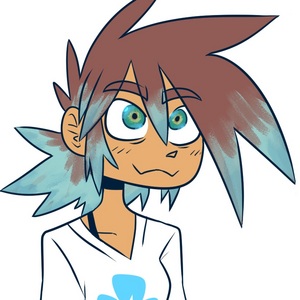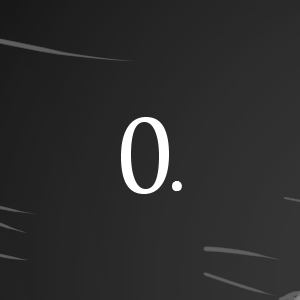I am The Reaper. Life is difficult for me, but so it is for everyone else, just as well. I live in Ireland, in a village that wants to be a town called Fogborn. We're farmers, mostly, but half of what we harvest is sold abroad. People still go hungry at home. I guess life is difficult for a lot of people, but I know it isn't hard for everyone. I should be thankful, I wouldn't exist without the trade routes.
My mother was Egyptian, and her mother was from India, and hers was from a place that might be called 'Siam'. I hear they're going to start calling it 'Ayutthaya', though. My father was a French Jew, his father was a Persian-Greek of the Hellenic gods, and his father was an Irish Catholic. Their mothers and wives brought in the Scottish, Nordic, German, Russian, and English, though in what way I never learned. That's all in four generations, in the last hundred years. People say "If you're from a land, you ARE that land." But I was born right here in Fogborn, in my great-grandfather's old house.
You're probably wondering how a farmer can read and write. I was one of the lucky kids selected to learn in The King's hold, a few days away. It was a sort of test: The King wants to know if people who can read are better for the market than people who can't. The King is a gentle man with a commanding presence. He has long blond hair, both from scalp and beard, that hangs to his sides like a lion's mane. He wants to be everyone's friend, but he beats himself up over petite faux-pas, and grows bitter to callous in defense of his pride. Sometimes he's happy, other times morose, and his in-between is the calm he shows at dinner, when he's laughing but not yet manic from wine. Then, and when the other tribes attack. He has a stern anger and never loses his head about things. The other leaders are scared of him, and he seems to win every battle.
Anyway, I wasn't lucky so much to be chosen, but to have been born to my parents. Well, not so much born to as raised by. My Egyptian great-grandfather is The Mentor of The King. An unsmiling man of rope and robe whose white hair seems to cling to him only in SPITE of falling, at the bottom of his face and nowhere on top of his head. He's the smartest person I know, but his feelings are like tough sand full of roots, and mine are like wind and water between blades of grass. Girls I like tend to be like rays of light, or tall shadows, or cotton balls, or clouds in the wind, but there were no girls in my class. It was just me, I was their first trial run.
The Mentor believed I have better memory than my seven siblings did at the time. I'm not sure why, but I can remember almost everything I've ever seen, though I have trouble with faces and more-so with names. I don't have a name myself, so that might be for the best; I'd probably forget it. My parents forgot to give me one when they were done naming the others. When I was growing up, they called me "boy", or "you", or "Reaper", knowing from my birth the job I was going to die with. I'm still a bit sore about them doing that. That's one of my problems, I remember some things too well, and I can hold a grudge about things nobody else remembers, against people I care for. And I can get lost in my memories, too.
Back to my story. While studying at the hold, I became deathly ill. I had boils on my arms and legs, and my face swelled up like a melon. The Mentor said the disease came from far away, and that The King's need for foreign furniture, delicacies, and information were both the life and death of him. To me, each new good was like a friend from one of my many homes. I spent a lot of time recovering on a Persian sofa, with a pillow from Egypt and an English-sewn wool blanket. The King had to re-cushion it when I got better. He's still a little sore, it cost him a few gold coins. Me, I'm okay now, but my sickness spread to my great-grandfather and took him in his sleep. I miss him. He would have known why the side of my face that swelled up no longer has as much feeling to it. He might have known what to do before the sickness returned years later, and took my parents and seven siblings.
Since then, I've been playing swords with my friend, The Knight. He's a handsome boy my age with hair like a raven. He says his English father married an Aztec princess, that he purchased from her father. But she died of the flu after giving birth. He says he can't get sick because his parents' blood became stronger from fighting the disease, before it was given to him. Is blood so much like a muscle? It makes me wonder if I was stronger than my family, or just luckier to have had my great-grandfather's attention.
The Knight likes my schemes. I'm not really interested in milling wheat for the rest of my life – for one thing, I don't even like it. Gruel makes me itch and swell, and I can't afford meat, so I mostly just eat the vegetables that others don't, from their gardens. They frown and call them "boring veggies", but I think they're delicious. I don't have any animals to make milk or eggs, only a dog and a cat. It's good for me they hunt their own food, or they'd starve. The Knight chops wood for the oven, and I make lunch for the both of us. He said he wants to live with me, but he needs to sleep at the barracks with the other Knights. They play pranks on him and rough him up, but he says he's stronger for it and needs them to be that way.
The Knight also told me he likes bread, but somehow, it seems to make people big and stupid. He thinks it's because eating grass turns you into a cow, which I thought was hilarious. I imagined it as hard as I could, breath evading me, and I played the cow on my knees, chewing grass and mooing low. He thought that was funny, but also kind of dumb, and told me to stop. He's fun, but serious too.
Oh, yeah. My schemes. Sometimes I say mean things about people, and I get crazy ideas about how I want to hurt them. I'm not evil, I just want revenge on them for being rude. Not only to me, but to each other. The Knight tells me his blood boils when he sees people being stupid. Well, mine gets hot when people are uncaring to one another. But mostly, they really are just cruel to me, calling me "bogmoor" because I'm "dark as mud". The Knight is a bit dark himself, but where I'm mud on a warm day, he's mud on a hot day, the color it is when it's already dried out and cracked. The girls really like him for his looks, not that he pays much attention to them. He seems mostly to spend time with me. One time, he joked that we should get married, and held my hand as if I were a wife. I regret it now, but I was embarrassed, and angry.
I said, "You know everyone hates me. I know you don't really feel that way."
He looked upset. I didn't see him for a week, when he was leaving with the other knights to fight in the King's name down the river. He came back again, and we spent some more time together. I'll tell about it later, it's a bit of a sensitive topic. The King called again, a few years later. The next time The Knight left, he never came home.
That was a year ago. It's 1350 now, under the Lord's sun and moon. Secretly, I think the old gods and The Lord are the same people, or perhaps he's their Lord and they're his dukes. The old gods wouldn't have minded me and The Knight in bonds, but the new one seems to. Maybe he's just lonely, like I am. Keeping something away he's afraid he might like. Don't they say he loves everyone anyway? Religion is full of contradictions, but so are people. I wonder how it could've been to hold with The Knight for a moon. I'll probably never find out, to be honest.
Anyway, without my friend to keep me out of trouble, I got up to some trouble. The Fielder has never been so angry. He's a man like dough, he looks different every day in his new set shape, simply by how he wakes up and on what side of his bed. Not his body, he isn't obese – I mean his face. Sometimes, he's a hard-chinned man, other times a gossipy princess, and others a myriad of things between. But he hardly seems aware of it. What he always is, he's driven, and a bit cross. He wants me to be his friend, but he's very fake with people, and I can't stand fake. Others love it, prefer it most of the time. He says that's called "putting in the effort". To his credit, everyone in town likes him, except for his reapers. As far as they're concerned, he's a wick short of a candle upstairs.
Spending long hours under the hot sun with no breaks, I contend with: dull blades; ensnaring weeds; animal carcass; dry musty brush; stray branches as big as trees their own; and bugs. There are more bugs than people alive, I'm certain. I got tired of it, and when The Black Plague arrived formally in Fogborn, not so casually as it met me or my family, I saw an opportunity. I pretended I was sick too. Many people really were, and died left and right – the fields were overgrown and still but for the wind. I was at home, using cloth and kettle water to fake fever to a brilliant man. His weakness is simply his own trust in himself; he believes he can't be lied to, that his mind is 'rubber' and bounces all deception. I don't know what 'rubber' is, but I suspect he's full of it. I spent the time reading and writing, making sure not to forget my words and meanings. My English was strong, but the tongues my parents spoke were fading from mine. I felt a great sadness, seeing symbols etched in the boards along the wall, and not being able to make them speak in my mind.
Well, my grieving was interrupted. The Fielder had some knights come to my house and drag me out to the field. He didn't care if I was sick or not – there'd be grain in it for me if I worked, so if I knew what was good for me, I'd work with whatever strength I had left before the wheat started to rot. I told him I didn't want grain, and he told me to trade it with someone. He handed me a long-handled scythe, much more extravagant than my usual bronze sickles, too brittle to last two moons. He said the blade was from Japan, forged by his cousin from around the world. He'd bought it for himself, but now, he was supposedly coming down with a sickness. He was ready to let me keep it, so long as I reaped that which I'd previously sewn. I held the scythe to the sun, and examined it. I was impressed with the snath's strong, but flexible wood, wowed to suit a body's presence within its curve. It was very unlike the short, straight handles I'd held on sickles before, inflexible and indifferent to the swinging of arms. Sickles demand fierce grip at the wrist and strong shoulders, they force you into a crouch to reach stems. They risk the fingers on your other hand when they start to dull, as you try to hold the grass like hair and saw through it. This was the opposite, and with it, I could stand and sway, side-to-side, letting tall wheat become yellow strands, cross-hatched. I was of the perfect height to reach the top of the stems, just under the seeds, without so much as bending my knees. The shining blade, silver as moonlight, was tempered stronger than a knight's broadsword, and curved like a crescent of light past dark. At this moment, witnessing the craftsmanship of this gift, and seeing his beaming pride in my use of it, I felt a respect that connected the two of us.
I'm sad to confess, I had one more trick up my sleeve. In my defense, I didn't want to use it. The scythe was a joy for work, and that joy lasted a moon, but The Fielder decided that if I didn't need grain, I should work for free. My home was next to the field, and his knights would grab me in the night, beat me, and toss me into the field 'fore the sun could scarcely lick the surface of the Earth.
He told me I was part of a greater good now, an' I said "That's a heavy load of horseshit, an' I hope you got it for a hell of a deal."
So he punched me in the eye, and stood over me as the sun began to rise so I stood in his long shadow.
Before he left, I told him: "I've given you my blood, sweat, and tears, but this work is meant for many, and I'm only one. It's impossible to do alone."
He simply shrugged. "Your scythe is worth ten sickles. You'll make short work of it, yet."
I shook my head, and said, "It's not worth ten men."
He turned away somewhat, and said in a gravelly voice just loud enough for rage, "There are no other men. The Black Plague has ruined me, what boils all my hands at blade, and makes gaunt the old and young. It's taken my wife, and my firstborn son. If you know where the dreaded shyte comes from, by all means go kill it dead – you're far more useful here if you can't."
His words left me confused. 'Was he out to challenge me?' I wondered. Perhaps that morning was a bad time for him to have chosen prose over practicum, because I was of a full mind to accept that challenge. Find the menace, and strangle it. It was better than threshing wheat, which turned me red with rash to consume. I decided I'd had enough.
That night, I grabbed The Mentor's rain cloak, black with drawstrings in front and light stitching around the edges, and a long hood like a trail. I put on my own jacket, my mother's leather gloves and boots, and her old satchel belts. I took my father's coin in my pouches, hidden in boards under his bed and now at my disposal. I used the iron key to lock the doors, and hid it under a potted plant. Then, gleaming scythe covered in dull rags, I paid one of my father's coins to a carriage jockey, and jumped into the back of his cart, among sacks of grain and barrels of milk. He was to bring me as far away as he could.












Comments (0)
See all